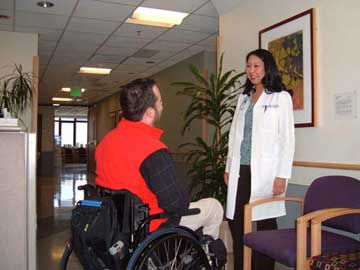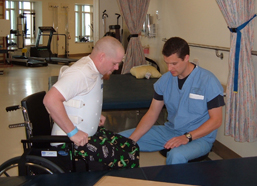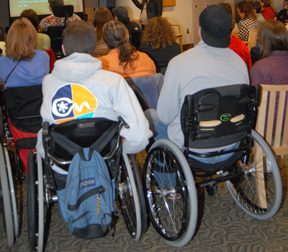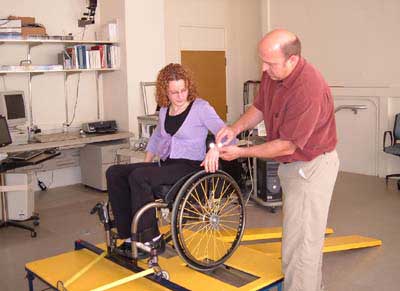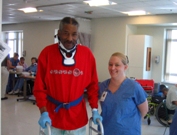SCI Forum Reports
Traveling with SCI
February 11, 2003
Resources are listed at the end of this report
Guest speaker Marge Jaques, Northwest Airlines customer services supervisor at SeaTac airport, distributed copies of the Northwest brochure "Air Travel for People with Disabilities," which reflects industry-wide requirements and practices. (Online information can be found at http://www.nwa.com/features/pcfaq.shtml ) "(Travelers with disabilities) have the same rights and responsibilities as all travelers," she said. To make things go smoothly, she strongly recommended calling ahead and talking to someone in person to discuss specific needs and concerns.
"Make sure you get your seat assignment when you make your reservation," she added. To make things go more smoothly, she also recommends arriving at the airport at least two hours before the flight. Airline personnel will make sure an aisle chair is available, if requested in advance. Travelers with special needs usually go on board first, although some people try to board last because they hope to be bumped up to first class. "Honestly, that's not likely," she said. "We're booked solid."
Everyone has to go through security, and hand-wands are usually used for people in wheelchairs. If there is metal in a passenger's shoes, the alarms will go off. "We have to evaluate if there's any alarm," Jaques said, which means the shoes will have to come off. "Like all passengers, you have the right to request a private wanding."
Airline personnel can assist travelers with the aisle chairs and transfers, but the in-flight crew cannot help with eating, medications, medical devices or personal care. A passenger's personal care attendant needs a separate ticket. Service dogs fly free-of-charge and sit on the floor next to their owners. Equipment-wheelchairs, shower chairs, etc.-are checked for free.
Travelers with problems or complaints should ask for the Complaint Resolutions Official (CRO). All airlines are required to have a CRO on duty at all times.
It is always with some reluctance that travelers relinquish their wheelchairs to the baggage area below because, in spite of everyone's best efforts, wheelchairs do sometimes get lost or damaged. "If your chair is unusable, we'll give you a suitable replacement until it is fixed," Jaques said. "Unlike regular luggage, there is no limit to what we will pay for a wheelchair replacement."
Experienced travelers with SCI recommend taking everything off the chair that's removable and carrying those parts onto the plane. They also advocate asking in-flight personnel to call the baggage handlers before take-off to confirm that the chair is in the luggage compartment. A wheelchair is tagged with the name of every stop along the way so the traveler can use the chair between connecting flights. "The wheelchair should be the last thing onto the plane and the first thing off," said Jaques. "That's the policy." She recommends scheduling a minimum of one hour between connecting flights.
Depending on what type they are, batteries must be either disconnected or removed before flight. Then the wheelchair goes into the luggage compartment of the plane and gets strapped down. There is an area in the passenger compartment that will accommodate one folded manual wheelchair on a first-come, first-served basis.
Several seasoned travelers with SCI served as panelists for the forum, and their collective wisdom was compiled in a comprehensive travel checklist and philosophy statement.
Click to download a pdf version of the Travel Checklist
Jay*, who has incomplete tetraplegia, said, "I always assume my baggage will be lost, so I carry anything I can't live without for a couple of days (catheters, medications) in a carry-on bag."
"I try not to let worries or problems ruin my trip," he added. "Often people mean well, they just don't know what to do."
Another issue for many is catheterizing during flight. "I've never been able to figure out how to go to the lavatory," Jay said. "I used to dehydrate to avoid it. Now I do it under a blanket."
It's not always easy or straightforward finding a hotel that's truly accessible to wheelchairs. Several travelers agreed that calling ahead and getting really specific about so-called accessible rooms-asking hotel personnel to measure the width of doors or the height of the toilet, for example-is essential. "A hotel may say they are accessible, but it may only mean the bathroom in the lobby (is accessible)," said one audience member.
Dave*, who has a C5 spinal cord injury, found Disney World in Orlando to be a very accessible destination for a vacation. "There were only a couple of things I couldn't do (at the park). They have a big accessibility department. I called ahead to talk about my needs, and I stayed in their hotel. It had a roll-in shower." Although Dave brought his own shower chair, others said they call ahead to their destinations and rent shower chairs. Dave has found that newer hotels tend to be more accessible than older, retrofitted ones and that hotels often don't charge for an attendant.
*Names have been changed to protect privacy.
Travel Resources
- Information & Resources
Gimp on the Go offers travel reviews, resources, bulletin board, and a newsletter on its interactive Web site.
http://www.gimponthego.com/
Access-Able Travel Source , information for mature and disabled travelers, includes travel tips, cruise lines, tours, monthly email newsletter, travel resources, a bulletin board, etc.
303-232-2979
email: access-able@attbi.com
website: http://www.access-able.com
Jim Lubin's Disability Travel and Recreation Resources - a comprehensive list of Web sites covering all aspects of travel and disabilities, including planning, foreign and domestic destinations, air travel, travel books, and more.
website: http://www.makoa.org/travel.htm
Global Access: Disabled Travel Network has information about trips and accommodations all over the world plus travel stories submitted by travelers with disabilities.
website: http://www.geocities.com/Paris/1502/
The National Clearinghouse on Disability and Exchange (NCDE) , a project managed by Mobility International (MIUSA) and sponsored by the Bureau of Educational and Cultural Affairs of the United States Department of State, provides free information and referral to individuals with disabilities interested in participating in international study, work, volunteer or research programs overseas and also advises exchange programs on how to accommodate participants with disabilities.
PO Box 10767
Eugene, OR 97440
541-343-1284
email: clearinghouse@miusa.org
website: http://www.miusa.org
SATH (Society for the Advancement of Travelers with Handicaps) has travel and access information for people with disabilities and publishes the magazine Open World.
email: sathtravel@aol.com
website: http://www.sath.org
Accessible Vacation Home Exchange for People with Disabilities is a free service connecting people who are interested in swapping homes with other persons with similar needs in other parts of the world. http://www.independentliving.org/vacaswap.html
New Horizons Information for the Air Traveler with a Disability, sponsored by the U.S. Dept. of Transportation, provides information regarding trip planning, what to do at the airport, getting on and off the plane, and compliance procedures.http://airconsumer.ost.dot.gov/publications/horizons.htm
U.S. Department of Transportation e-mail address to register your concern about airline service when experiencing air travel service problems concerning accommodations or services that must be provided to passengers with disabilities: email: airconsumer@ost.dot.gov
- Travel and Tour Companies
Access Challenge is a wilderness backcountry hiking and camping experience involving able-bodied and disabled participants, sponsored by the British Columbia Mobility Opportunities Society
604-688-6464, ext. 101
email: bcmos@reachdisability.org
website: http://www.reachdisability.org/bcmos
Alaska Welcomes You (AWY) offers accessible tours, cruises, accommodations, and activities in Alaska for travelers with disabilities
800-349-6301
http://www.accessiblealaska.com
Access Aloha organizes tours and provides information for people with disabilities who want to travel to Hawaii
808-545-1143
800-480-1143
http://www.accessalohatravel.com
Wilderness Inquiry offers canoe, raft, sea kayak, dogsled, and horse pack tours of wilderness areas in North America for people of all ages and abilities, including people with disabilities
1313 Fifth St., Box 84
Minneapolis, MN 55414-1546
800-728-0719
http://www.wildernessinquiry.org
Accessible Journeys plans cruises and operates tours for people with physical disabilities. Newsletter subscription available
35 West Sellers Ave.
Ridley Park, PA 19078
800-846-4537
610-521-0339
email: sales@disabilitytravel.com
website: http://www.disabilitytravel.com
Cruise Planners offers worldwide destinations, accessible transfers and assistive equipment rental
800-801-9002
603-942-7191
email: sales@love2cruise.com
website: http://www.love2cruise.com
Yvonne's Orlando Holidays provides private homes in the Disney area of Orlando Florida, available for short-term vacation rentals
877-714-1144
email: info@villasorlando.com
website: http://www.villasinorlando.com
- Transportation Companies
Amtrak offers discounts and accommodations for disabled travelers. Call for information, reservations, and a copy of Access Amtrak: A Guide to Amtrak Services for Travelers with Disabilities.
800-872-7245
website: http://www.amtrak.com
Greyhound Lines, Inc. , provides assistance to people with disabilities, and allows personal care attendants to travel at no charge. For information, call their ADA Assist Line at 800-752-4841 or 800-345-3109 (TDD/TTY), 24 hours a day http://www.greyhound.com - Accessible Van Rentals
Accessible Vans of America , has a national network of wheelchair accessible van rentals, sales and service
4 Beryl Road
Paoli, PA, 19301
800-282-8267 or 602-231-8881
website: http://www.accessiblevans.com - Magazines & Newsletters
Access for Disabled Americans , Excellent source for U.S. accessible travel, this quarterly newsletter tunes the reader into a full range of travel opportunities. Subscription is by donation.
436 14th St. #200
Oakland, CA 94612
510-419-0768
email: PSmither@aol.com
Mobility International , one of the pioneers for disabled travelers, offers a quarterly newsletter with worldwide travel resources and opportunities, Over the Rainbow, $15/year
PO Box 10767
Eugene, OR 97440
541-343-1284
Open World
SATH (Society for Advancement of Travelers with Handicaps)
347 Fifth Ave., Ste. 610, New York, NY 10016
212-447-7284
email: sathtravel@aol.com
website: http://www.sath.org
Emerging Horizons , (quarterly/$14.95)
C&C Creative Concepts
PO Box 278
Ripon, CA 95366;
website: http://www.emerginghorizons.com
email: horizons@emerginghorizons.com
Travelin' Talk Newsletter , network and directory
website: http://www.travelintalk.net
email: travelin@travelintalk.net - Books
How to Travel: A Guidebook for Persons with a Disability , by Fred Rosen, (1997; $9.95; Science & Humanities Press, PO Box 7151, Chesterfield, MO 63006-7151 tel. 314-394-4950)
website: http://www.banis-associates.com/books
email: banis@banis-associates.com
Great American Vacations for People with Disabilities , (1996; $19.50; Fodor Travel Publications, Random House Order Department, 400 Hahn Road, Westminster, MD 21157; 800-733-3000).
Travel after Spinal Cord Injury (Fact sheet 15), ($3.00; National Spinal Cord Injury Association, 8300 Colesville Rd., Ste. 551, Silver Spring, MD 20910; 800-962-9629)
website: http://www.spinalcord.org
Easy Access to National Parks: The Sierra Club Guide for People with Disabilities , (1992; $16.00; Sierra Club Store, 85 2nd St., San Francisco, CA 94105; 800-935-1056)
website: http://www.sierraclub.org/books

